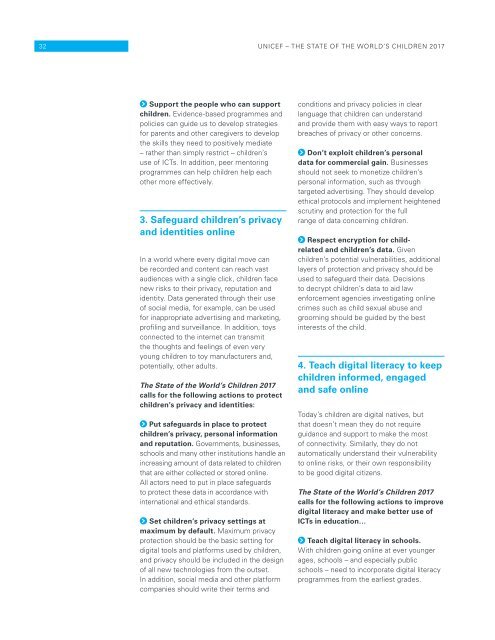SOWC_2017_Summary_En_WEB_FINAL
Create successful ePaper yourself
Turn your PDF publications into a flip-book with our unique Google optimized e-Paper software.
32<br />
UNICEF – THE STATE OF THE WORLD’S CHILDREN <strong>2017</strong><br />
Support the people who can support<br />
children. Evidence-based programmes and<br />
policies can guide us to develop strategies<br />
for parents and other caregivers to develop<br />
the skills they need to positively mediate<br />
– rather than simply restrict – children’s<br />
use of ICTs. In addition, peer mentoring<br />
programmes can help children help each<br />
other more effectively.<br />
3. Safeguard children’s privacy<br />
and identities online<br />
In a world where every digital move can<br />
be recorded and content can reach vast<br />
audiences with a single click, children face<br />
new risks to their privacy, reputation and<br />
identity. Data generated through their use<br />
of social media, for example, can be used<br />
for inappropriate advertising and marketing,<br />
profiling and surveillance. In addition, toys<br />
connected to the internet can transmit<br />
the thoughts and feelings of even very<br />
young children to toy manufacturers and,<br />
potentially, other adults.<br />
The State of the World’s Children <strong>2017</strong><br />
calls for the following actions to protect<br />
children’s privacy and identities:<br />
Put safeguards in place to protect<br />
children’s privacy, personal information<br />
and reputation. Governments, businesses,<br />
schools and many other institutions handle an<br />
increasing amount of data related to children<br />
that are either collected or stored online.<br />
All actors need to put in place safeguards<br />
to protect these data in accordance with<br />
international and ethical standards.<br />
Set children’s privacy settings at<br />
maximum by default. Maximum privacy<br />
protection should be the basic setting for<br />
digital tools and platforms used by children,<br />
and privacy should be included in the design<br />
of all new technologies from the outset.<br />
In addition, social media and other platform<br />
companies should write their terms and<br />
conditions and privacy policies in clear<br />
language that children can understand<br />
and provide them with easy ways to report<br />
breaches of privacy or other concerns.<br />
Don’t exploit children’s personal<br />
data for commercial gain. Businesses<br />
should not seek to monetize children’s<br />
personal information, such as through<br />
targeted advertising. They should develop<br />
ethical protocols and implement heightened<br />
scrutiny and protection for the full<br />
range of data concerning children.<br />
Respect encryption for childrelated<br />
and children’s data. Given<br />
children’s potential vulnerabilities, additional<br />
layers of protection and privacy should be<br />
used to safeguard their data. Decisions<br />
to decrypt children’s data to aid law<br />
enforcement agencies investigating online<br />
crimes such as child sexual abuse and<br />
grooming should be guided by the best<br />
interests of the child.<br />
4. Teach digital literacy to keep<br />
children informed, engaged<br />
and safe online<br />
Today’s children are digital natives, but<br />
that doesn’t mean they do not require<br />
guidance and support to make the most<br />
of connectivity. Similarly, they do not<br />
automatically understand their vulnerability<br />
to online risks, or their own responsibility<br />
to be good digital citizens.<br />
The State of the World’s Children <strong>2017</strong><br />
calls for the following actions to improve<br />
digital literacy and make better use of<br />
ICTs in education…<br />
Teach digital literacy in schools.<br />
With children going online at ever younger<br />
ages, schools – and especially public<br />
schools – need to incorporate digital literacy<br />
programmes from the earliest grades.


